Court Dismissed Lawsuit Against Iran Hijab Policeman Who Shot A Man
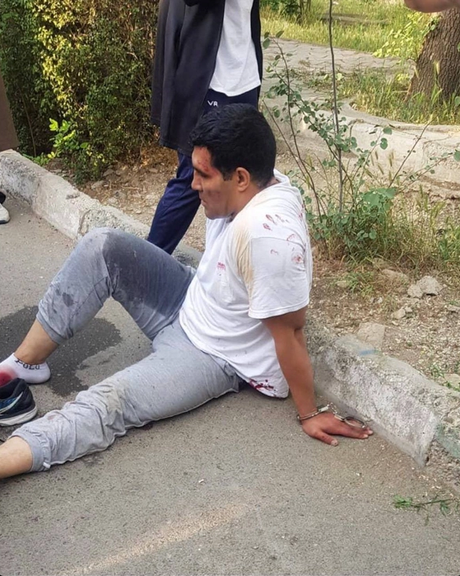
A court in Iran has dismissed a lawsuit by an Iranian boxer who was shot by a morality police officer while he was promenading in a park with his wife and 11-month daughter.

A court in Iran has dismissed a lawsuit by an Iranian boxer who was shot by a morality police officer while he was promenading in a park with his wife and 11-month daughter.
Reza Moradkhani said in an interview with Shargh daily published Saturday that they were walking in the Pardisan park in Tehran late in May when a 22-year-old morality police officer confronted his wife, Maria Arefi, and following verbal confrontation with the agents they pepper sprayed Moradkhani and Arefi and even their toddler.
Moradkhani then charged for one of the agents who had insulted his wife and the agent fired 10 shots at him, four of which hit the Iranian national team boxer, resulting in his hospitalization.
The Moradkhanis said that they had filed a complaint at the military court but that the court ruled against them and charged them with removing hijab and attacking a police officer.
The incident has gone viral on Iranian social media, with people condemning hijab policing and police impunity.
The paper quoted a witness as saying that the police officer who fired at Moradkhani forced bystanders who were recording the incident to erase their phones.
Moradkhani, who has been a boxer for the Iranian national team for many years and has won several Asian and world medals, is now unable to continue coaching due to the injuries in the incident.

A conservative newspaper in Iran has called on President Ebrahim Raisi to shut down the Islamic Propagation Organization and spend the budget on pressing needs.
In an editorial authored by the daily's outspoken managing editor Masih Mohajeri on June 9, Jomhouri Eslami [Islamic Republic] writing about the Iranian government's economic problems said, "A government that holds up payments to pensioners as a bid to solve its economic problems should prioritize its expenditures and get rid of unnecessary organizations."
The daily asked: "Some of Iran's cultural organizations do nothing other than duplicating the efforts of other government institutions. For instance, what kind of service is the Islamic Propagation Organization rendering that justifies its survival?" The newspaper maintained: "The high-maintenance organization should have attained its initial goals during the past 40 years [of an Islamic government]. If it hasn't, it means that it has not been successful."
The Islamic Propagation Organization is a body that operates in parallel with Ministry of Culture and Islamic Guidance and one of its objectives is offering guidelines to Friday Prayer Imams in cities and towns nationwide.
Over the past four decades, the organization's main function has been justifying the government's policies and trumpeting the ideas of fundamentalists in Iran such as the Friday Prayer Imams in Isfahan and Mashhad. The two clerics are often criticized by the people for undermining human rights and advocating violence against women and those who follow a lifestyle different from the preferences of the fundamentalists.
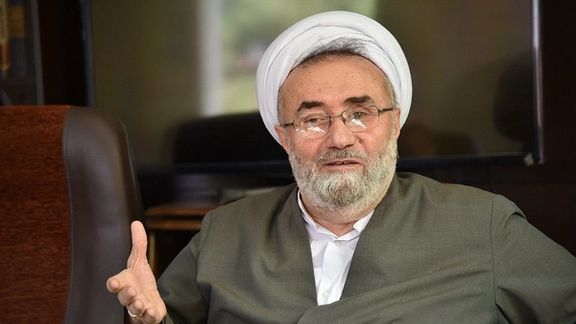
Last week, a young man in Isfahan attacked Yousef Tabatabainejad, the Imam in Isfahan who had opined that people can attack "bad-hijab" women at their own discretion. In their sermons on Friday June 10, several imams made outlandish statements. Ignoring Iran's economic problems, Rasoul Abdollahi who led the prayers in Tabriz said that Raisi's economic policy is being followed in Russia as an economic model for resistance.
Meanwhile, Mohamad Nabi Mousavi Fard in Ahwaz called for shaming those who undermine “Islamic values in the streets” as a lesson for others, while Ahmad Khatami in Tehran and many others in other cities repeated the official jargon about a resolution passed this week at the UN nuclear watchdog, the IAEA, criticizing Iran's non-cooperative behavior and praised the government for undermining IAEA safeguards.
In another article on Thursday, the Jomhouri Eslami wrote that the government has increased the Islamic Propagation Organization's budget by 156 per cent in for the current year. The article charged that the government of President Ebrahim Raisi has started what he called an "economic surgery" by targeting the poorest Iranians while giving more funds to government bodies such as the Islamic Propagation Organization.
Last year the organization received around $40 million based on the average exchange rate in 2021, there fore this year the appropriation is more than $100 million. Although this might not seem like a large sum by Western standards, in Iran an average person has a salary of $150 per month.
Overall, the government spends close to $800 million on propaganda outfits, not counting the state television with close to 40,000 employees and a $200 million budget plus advertising income.
The article went on to say that such organizations have been a burden on the country's annual budget and national financial resources for years without being able to contribute to productive efforts or the nation's welfare. The daily argued that economic pressures should be distributed fairly among various parts of the government and groups of the population.

Friday Prayer leaders in Iran have backed the government’s decision to reduce access to the UN nuclear watchdog, IAEA, in the wake of a critical resolution adopted against Tehran.
The Friday Imams described removing the monitoring equipment installed by the International Atomic Energy Agency as the first step in reducing relations with the agency, with Tehran's Friday prayer Imam Ahmad Khatami condemning the IAEA resolution against Iran and saying that “the revolutionaries hit the bully in the mouth."
Referring to the IAEA director general Rafael Mariano Grossi's visit to Israel, the hardliner cleric called on the authorities "not to provide complete information to the IAEA."
Similar remarks against the resolution and IAEA’s monitoring of Iranian facilities were made during the Friday prayer sermons in several other cities, including Esfahan, Arak, Bushehr, Ilam, and Ahvaz.
Iran told the IAEA it plans to remove more monitoring equipment after the 35-member IAEA board Wednesday passed the resolution. Tehran says it intends to maintain a basic level of monitoring and inspectors’ access as required under the Nuclear Non-Proliferation Treaty (NPT).
The contents of Friday Prayer sermons delivered by Khamenei's local representatives in various cities are dictated by two state bodies close to Khamenei's office, officially known as "The Policy-making Council for Friday Prayer Imams" and the "Friday Prayer Headquarters," both dominated by hardliner clerics.
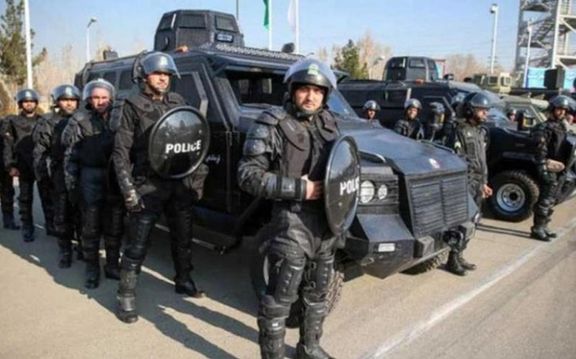
Amid a growing wave of protests across Iran, the country’s police have added about $10 million worth of anti-riot equipment to law enforcement forces, including special armored vehicles.
The deputy commander of the Iranian police, Brigadier-General Ghasem Rezaei, made the announcement during a ceremony where some of the equipment was handed over to special units, including 527 vehicles and motorcycles.
Rezaei said that the new equipment and vehicles will help the operational units better execute their missions and is aimed at "strengthening the security of the country."
In addition to enhancing operational mobility, some of the new equipment provides police forces with “self-protection” during missions, he added.
Iran has tens of thousands of special police and security units that are often deployed to break up antigovernmental protests that have become more frequent since 2017.
In November 2019, when a sudden government price increase for fuel was announced and nationwide demonstrations began, these security forces were ordered to shoot unarmed protesters, killing at least 1,500 people in a matter of a few days.
Last year, special forces were used in two provinces to quell protests during which more than ten people were killed and hundreds wounded.

Three human rights groups called on Meta, the owner of the social networks Instagram and Facebook, to review its Persian-language content review procedures for Iran.
Digital civil rights group Access Now, London-based rights organization Article 19, and New York-based Center for Human Rights in Iran met with a senior official from Meta on Thursday to convey their concerns over the company censoring content by Iranian dissidents and democracy advocates.
The groups said they made recommendations to Meta and Meta’s Oversight Board in an effort to streamline processes to ensure freedom of expression is protected for users who rely on their platform in Iran, especially during protests.
The groups initiated action following allegations that Instagram content moderators are deleting accounts that have documented the regime’s rights abuses during the latest wave of protests, including content showing Iranian security forces beating protesters and firing tear gas into crowds.
BBC’s sources alleged that pro-regime employees of the German branch of Telus International, a Canadian contractor, which provides content moderation to Instagram with over 400 Iranian employees for reviewing Persian-language content, are responsible for restricting anti-government content of Iranian users.
In an investigative report, Deutsche Welle Farsi revealed that Mehdi Norouzi, the son of a former Islamic Republic envoy to Bulgaria -- Abdollah Norouzi, works at the Telas International branch in Sofia.
US lawmakers have also launched a probe into the Meta’s restrictions on Iranian dissidents’ contents.
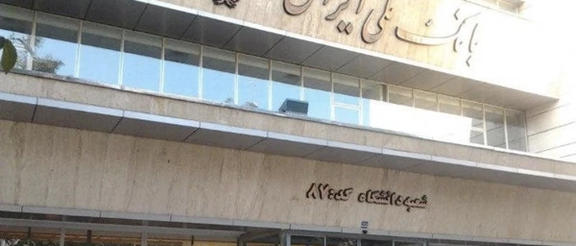
Police resorted to force Wednesday to break up a protest rally by people whose safety deposit boxes were robbed in a bank heist in a central Tehran branch of Iran’s largest bank.
According to footage circulating in social media, security forces fired warning shots and used violence to disperse the gathering of people in front of the robbed branch of the bank near the University of Tehran.
State-owned Bank Melli (National Bank) public relations office announced that the head and deputy head of the branch had been fired "for negligence." But hundreds of people who lost their life savings or important documents demand compensation.
Officials said an investigation was also underway, with several bank employees “under observation” for possible “dereliction of duty.” Three suspects are being interrogated in custody.
The gall of the robbers has fed social media speculation, and even comparisons with famous bank robberies elsewhere in the world, like the 1983 Brink’s Mat heist in the United Kingdom.
Bank Melli issued a statement on Tuesday denying social media reports that 1,000 boxes had been breached, saying thieves had entered the branch and accessed 168 safety deposit boxes. Earlier reports said the number was 200 to 250 boxes.
The exact details of the stolen property and documents have not yet been released, and in the past two days some Bank Melli officials have stated that the bank "has no criminal and legal responsibility for the contents of the boxes."
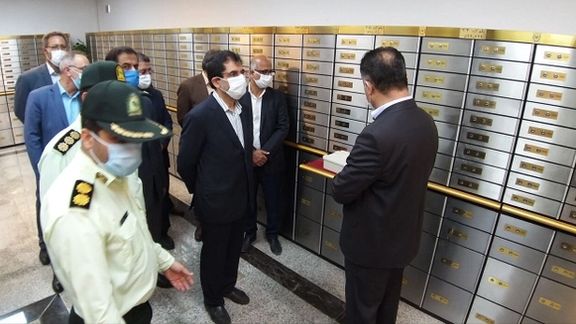
Media and officials in Tehran say it is not clear what the bank robbers stole from the safety deposit boxes, since banks have no information about what people put in these boxes, which are used to safely store personal mementoes, precious foreign currency, and gold coins bought as a hedge against inflation.
It is also not clear if there is any kind of insurance covering losses sustained by customers. One report last year suggested Iranians were keeping $25-$30 billion in cash “at home,” which would include money in bank deposit boxes.
The bank is about half a mile from the headquarters and residence of Supreme Leader Ali Khamenei.
Iran was on a four-day holiday from Thursday to Sunday marking the death anniversary of Ayatollah Ruhollah Khomeini, founder of the Islamic Republic. Apparently, the robbers gained access during the holiday, and it is not clear how long they were inside. They managed to open four sealed doors, reached the coffers, and destroyed security cameras, and took the hard drives, practically leaving no trace behind.
One former bank official told Iranian media that it would next to impossible to break through one of the main safe doors protecting the safe deposit boxes. “One would need days to break through the door with blow torches,” he said. Some doors were protected with electronic passes, codes and alarms.
A series of suspicious events that happened since last week, has led to speculations that the robbers may have sought some specific documents and have come from abroad for the heist.
On Thursday, an Iranian hacktivist group named ‘Uprising till Overthrow' hacked into and deactivated over 5,000 surveillance cameras and 150 websites and online services of Tehran Municipality. The robbery happened in the early hours of Friday. And the passport control system at Tehran's Imam Khomeini International Airport was reportedly hacked on Saturday, stranding passengers for a couple of hours.